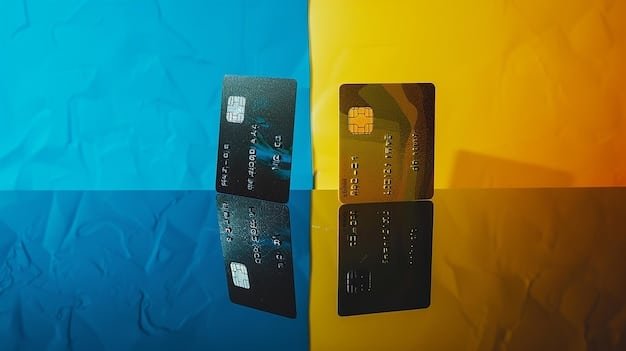Secured Credit Cards vs. Credit Builder Loans: Boost Your Score by 100 Points

Secured credit cards and credit builder loans are two distinct financial tools designed to help individuals with limited or damaged credit histories improve their credit scores; choosing between them depends on individual financial circumstances and goals, with each offering unique benefits and drawbacks regarding accessibility, cost, and impact on credit score enhancement.
Struggling to improve your credit score? You’re not alone. Many Americans face the challenge of building or rebuilding credit. Two popular options are secured credit cards vs. credit builder loans: Which Option is Best for Raising Your Credit Score by 100 Points? Let’s explore which one is right for you.
Understanding Secured Credit Cards
Secured credit cards are designed for people with bad credit or little credit history. They require a cash deposit as collateral, which typically becomes the credit limit.
This deposit protects the issuer if you don’t pay your bill. However, responsible use can significantly improve your credit score.
How Secured Credit Cards Work
To get a secured credit card, you’ll need to provide a security deposit. Here’s how it works:
- Application: Apply for a secured credit card with a specific issuer.
- Security Deposit: Provide a cash deposit, usually equal to your credit limit.
- Credit Limit: Your credit limit is usually the same as your deposit.
- Usage: Use the card like a regular credit card, making purchases and paying your bill on time.
- Credit Building: The issuer reports your payment activity to credit bureaus.
Benefits of Secured Credit Cards
Secured credit cards offer several advantages:
- Easier Approval: Easier to get approved for, even with bad credit.
- Credit Building: Help build or rebuild your credit history with responsible use.
- Potential Graduation: Some cards may “graduate” to unsecured cards with good behavior.

Using a secured credit card wisely involves keeping your credit utilization low (ideally below 30% of your credit limit) and always paying your bills on time. This demonstrates responsible credit management, which can lead to significant improvements in your credit score. Over time, consistent responsible use may also lead to the card issuer returning your security deposit and upgrading you to an unsecured credit card.
In conclusion, secured credit cards are a great starting point for individuals looking to establish or re-establish credit. They offer a pathway to creditworthiness through responsible financial habits.
Exploring Credit Builder Loans
Credit builder loans are designed to help people with poor or limited credit build credit. These loans work differently than traditional loans.
Instead of receiving the money upfront, the loan provider holds the funds and you make payments, which are reported to credit bureaus.
How Credit Builder Loans Work
Here’s a breakdown of how credit builder loans typically function:
- Application: Apply for a credit builder loan from a credit union, community bank, or online lender.
- Loan Amount Held: The lender holds the loan amount in a secured account.
- Monthly Payments: You make fixed monthly payments over a set period.
- Credit Reporting: The lender reports your payments to credit bureaus.
- Funds Released: Once you’ve made all payments, you receive the loan amount.
Advantages of Credit Builder Loans
Credit builder loans offer unique benefits for those looking to improve their credit score:
- Forced Savings: Help you save money while building credit.
- Credit Reporting: Payment history is reported to credit bureaus, aiding credit improvement.
- Access to Funds: You receive the loan amount after successfully completing the payments.
A key strategy with credit builder loans is to ensure that you can consistently make the monthly payments on time. Setting up automatic payments can help you avoid missed payments, which can negatively impact your credit score. Additionally, carefully review the loan terms, including interest rates and any associated fees, to ensure that the loan is a good fit for your financial situation.

In summary, credit builder loans provide a structured approach to building credit while also encouraging savings habits. They can be an effective tool for individuals who need both credit improvement and a savings boost.
Cost Comparison: Secured Credit Cards vs. Credit Builder Loans
When deciding between secured credit cards and credit builder loans, consider the costs involved. Both options have different fees and interest rates that can impact your overall expenses.
Understanding these costs will help you choose the most cost-effective way to improve your credit.
Secured Credit Card Costs
Here are the common costs associated with secured credit cards:
- Annual Fees: Some secured cards charge annual fees, which can range from $25 to $75.
- Interest Rates: Secured cards often have higher interest rates (APR) compared to unsecured cards.
- Late Payment Fees: Fees charged for late payments, similar to unsecured cards.
Credit Builder Loan Costs
Credit builder loans also come with their own set of costs:
- Interest Rates: Interest rates on credit builder loans can vary.
- Fees: Some lenders may charge application or administrative fees.
When evaluating the costs, calculate the total interest and fees you’ll pay over the life of the credit builder loan. For secured credit cards, focus on avoiding interest charges by paying your balance in full each month. Also, look for cards with no annual fees to minimize expenses. Comparing these costs will help you make an informed decision.
In conclusion, both secured credit cards and credit builder loans involve costs, but understanding these expenses can help you choose the option that best fits your budget and financial goals.
Impact on Credit Score: Which Works Faster?
One of the primary goals of both secured credit cards and credit builder loans is to improve your credit score. However, the speed at which they impact your credit can vary.
Here’s what you need to know about how each option can affect your credit score and how quickly you might see results.
Secured Credit Card Impact
Secured credit cards primarily impact your credit score through:
- Payment History: On-time payments are reported to credit bureaus, improving your score.
- Credit Utilization: Keeping your balance low (below 30%) positively affects your credit score.
Credit Builder Loan Impact
Credit builder loans impact your credit score through:
- Payment History: Consistent on-time payments are reported, boosting your credit score.
- Credit Mix: Adding a different type of credit (installment loan) can diversify your credit profile.
To maximize the impact on your credit score, use a secured credit card responsibly by keeping balances low and paying bills on time. With a credit builder loan, ensure you make every payment on schedule. The speed at which you see results can also depend on how often the lender reports to credit bureaus and the specific details of your credit history. Remember, building credit takes time and consistent effort.
Eligibility and Approval: Who Can Get Approved?
Eligibility and approval are crucial factors when deciding between secured credit cards and credit builder loans. Understanding the requirements for each can help you determine which option is more accessible.
Here’s a breakdown of who can typically get approved for each type of credit-building tool.
Secured Credit Card Eligibility
Secured credit cards are generally easier to get approved for because:
- Bad Credit Accepted: Designed for those with poor or limited credit history.
- Security Deposit: The deposit reduces the risk for the issuer.
Credit Builder Loan Eligibility
Credit builder loans may have slightly stricter requirements, including:
- Income Verification: Some lenders may require proof of income.
- Credit Check: A credit check may still be performed, although approval standards are often more lenient than traditional loans.
To improve your chances of approval for either option, ensure you have a stable income and address any outstanding debt. If you have very poor credit, a secured credit card may be the easier starting point. If you have some income and can meet the loan requirements, a credit builder loan may be a viable choice.
In summary, while secured credit cards are generally easier to get approved for, credit builder loans can be accessible if you meet certain income and credit criteria.
Which Option is Right for You?
Choosing between secured credit cards and credit builder loans depends on your individual circumstances and financial goals. Consider the following factors to help you decide which option is best for you.
By weighing these considerations, you can make an informed decision that aligns with your credit-building needs.
Consider Your Financial Situation
Assess your current financial situation, including:
- Budget: Can you afford the monthly payments on a credit builder loan or the security deposit for a secured card?
- Savings: Do you have savings available for a security deposit on a secured card?
Evaluate Your Credit Goals
Determine what you want to achieve with your credit-building efforts:
- Credit Score Improvement: Are you aiming for a specific score increase, such as 100 points?
- Credit Mix: Do you want to diversify your credit profile with an installment loan?
If you have limited savings and want an easier approval process, a secured credit card may be the better option. If you need a structured savings plan in addition to credit building, a credit builder loan might be more suitable. Consider your personal preferences and financial discipline to make the right choice.
| Key Point | Brief Description |
|---|---|
| ✅ Accessibility | Secured cards are typically easier to get approved for than credit builder loans. |
| 💰 Cost | Consider interest rates, annual fees, and potential late payment fees. |
| 📈 Credit Impact | Both can improve your credit score with responsible use, but the speed varies. |
| 🎯 Savings | Credit builder loans help you save while building credit; secured cards don’t. |
Frequently Asked Questions
▼
Yes, you can have both. Using them together could potentially boost your credit score faster by diversifying your credit mix, but ensure you can manage both responsibly.
▼
The timeline varies based on your starting score and responsible use. Some users report seeing significant improvements within a few months, while others may take longer.
▼
Missing a payment can negatively impact your credit score. Contact your lender immediately to discuss options and avoid further damage. Set up automatic payments to prevent missed payments.
▼
Not all secured cards automatically convert. Some issuers offer “graduation” to an unsecured card after consistent responsible use. Check with your issuer for their specific policy.
▼
Yes, a credit builder loan is generally considered a secured loan because the lender holds the loan funds in an account until you have completed your payments.
Conclusion
Ultimately, the best option between secured credit cards and credit builder loans depends on your unique financial situation and goals. Both strategies can effectively improve your credit score with responsible management, so choose the one that aligns with your needs and preferences.





